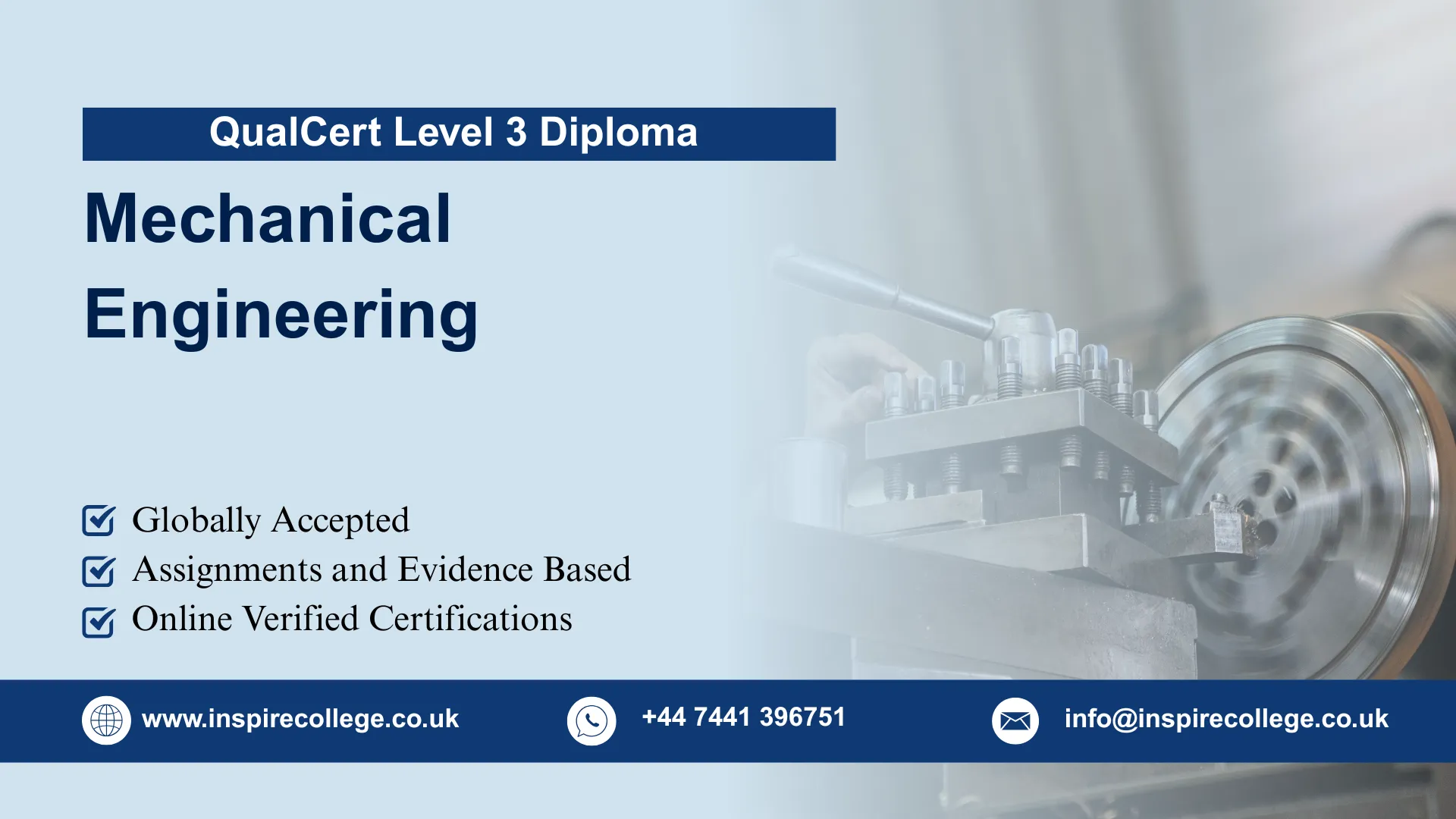
QualCert Level 3 Diploma in Mechanical Engineering
Mechanical engineering is one of the most versatile and foundational disciplines in the world of science and technology. It underpins the design, analysis, manufacture, and maintenance of machinery and mechanical systems that power industries such as automotive, aerospace, energy, manufacturing, and robotics. The QualCert Level 3 Diploma in Mechanical Engineering is a comprehensive program designed to provide learners with advanced technical knowledge, practical skills, and professional competencies required to excel in modern engineering environments.
QualCert Level 3 Diploma in Mechanical Engineering offers an in-depth exploration of mechanical principles, including mechanical design, materials science, thermodynamics, fluid mechanics, and mechanical systems analysis. Students will acquire the ability to apply these principles to real-world engineering problems, ensuring efficiency, reliability, and safety in mechanical operations. By combining theoretical understanding with practical, hands-on experience, the program equips learners to design, assemble, and maintain complex mechanical systems, preparing them for dynamic roles in a rapidly evolving industry.
Learners will gain experience in essential areas such as computer-aided design (CAD), manufacturing processes, mechanical component analysis, quality assurance, and maintenance planning. Emphasis is placed on problem-solving, critical thinking, and innovative approaches to mechanical challenges. Students will also develop skills in the use of industry-standard tools, machinery, and simulation software, enabling them to bridge the gap between conceptual design and practical application.
Graduates of QualCert Level 3 Diploma in Mechanical Engineering are well-prepared for careers as mechanical engineering technicians, design engineers, maintenance engineers, production supervisors, and quality control specialists. The qualification also provides a strong pathway for further study in advanced mechanical engineering, industrial design, or engineering management programs.
This QualCert Level 3 Diploma in Mechanical Engineering ensures that learners emerge as competent, industry-ready professionals capable of contributing effectively to engineering projects, enhancing operational efficiency, and supporting technological innovation in diverse sectors.
To ensure that learners can successfully engage with the curriculum and derive maximum benefit from the Level 3 Diploma in Mechanical Engineering, candidates are expected to meet certain entry criteria. These requirements are designed to provide a solid foundation for understanding complex engineering principles, practical applications, and industry-standard practices.
- Age Requirement: Candidates should generally be at least 16 years of age or older at the time of enrolment. This age requirement ensures that learners possess the necessary maturity, responsibility, and commitment to engage effectively with the advanced technical concepts, practical exercises, and assessments included in the course. By meeting this criterion, students are better prepared to handle the academic rigor, participate actively in hands-on training, and apply their learning to real-world industry scenarios with professionalism and confidence.
- Academic Qualifications:
- A minimum of 4–5 GCSEs (or equivalent) at grades A*–C (or 9–4) is usually expected.
- Essential subjects include Mathematics and a Science subject, preferably Physics or Chemistry, to establish a strong foundation in engineering principles.
- Alternatively, learners who have completed Level 2 Diplomas or equivalent vocational qualifications in Engineering, Mathematics, Science, or related fields are also eligible.
- Work Experience (Optional): Candidates with relevant professional experience in engineering, manufacturing, or technical industries may be considered even if they do not meet traditional academic qualifications. Practical experience provides valuable context for understanding technical concepts.
- Foundational Knowledge: A strong foundation in mathematics and science, with particular emphasis on physics, is essential for learners to fully comprehend the complex engineering principles, calculations, and technical concepts presented throughout the course. This knowledge enables students to accurately perform measurements, analyze system behaviors, understand material properties, and apply theoretical concepts to practical, real-world scenarios in quality assurance, piping, and welding inspection. By possessing these fundamental skills, learners are better equipped to solve engineering problems, interpret technical data, and succeed in both the academic and professional aspects of the program.
- Language Proficiency:
- Proficiency in the language of instruction, typically English, is required.
- Non-native English speakers must provide evidence of English competence to effectively comprehend course materials, participate in discussions, complete written assignments, and communicate technical concepts.
- Preparation for Success: Meeting these entry requirements ensures that learners are well-prepared to engage with the Level 3 Mechanical Engineering curriculum, gain practical skills, and progress in careers or higher education within the mechanical and industrial engineering sectors.
Mandatory Units
The QualCert Level 3 Diploma in Mechanical Engineering is a 60 credits qualification with a Total Qualification Time (TQT) of 300 hours, including 210 Guided Learning Hours (GLH). This course is thoughtfully designed to provide targeted and efficient skill development in the field of Mechanical, offering learners a solid foundation to build their expertise..
Mandatory Units
Upon successful completion of the QualCert Level 3 Diploma in Mechanical Engineering, learners will have developed a strong foundation in both theoretical and practical aspects of mechanical engineering. Graduates will be equipped with the knowledge and skills to tackle complex engineering challenges across a wide range of industrial and technological applications. Specifically, learners will be able to:
Engineering Materials Science
- Understand the properties, behavior, and characteristics of various engineering materials, including metals, polymers, ceramics, and composite materials.
- Apply material selection principles to make informed decisions for solving engineering design challenges while balancing strength, durability, cost, and performance requirements.
- Analyze material performance under different operational and environmental conditions to ensure safety, reliability, and efficiency in mechanical systems.
- Evaluate how different processing and manufacturing techniques impact material properties and structural performance.
- Understand common material failure mechanisms, including fatigue, corrosion, and fracture, and their implications for the safety and longevity of engineering systems.
Dynamics and Vibration Analysis
- Develop a thorough understanding of dynamic systems and how they respond to external and internal forces.
- Apply principles of vibration analysis to predict, control, and mitigate vibrations in machinery, structures, and mechanical components.
- Analyze the dynamic behavior of mechanical systems under varying load conditions using mathematical models and simulation tools.
- Evaluate damping techniques and vibration control methods to enhance operational stability and performance.
- Use computational and analytical tools to simulate dynamic responses for improved system design and safety.
Finite Element Analysis (FEA) and Simulation
- Apply finite element methods (FEM) to solve complex engineering problems involving stress, strain, deformation, and structural behavior.
- Develop proficiency in using FEA software to simulate mechanical systems and predict performance outcomes.
- Interpret simulation results to optimize engineering designs, improve material utilization, and enhance overall system reliability.
- Understand the importance of boundary conditions, meshing strategies, and solution techniques for accurate and reliable simulations.
- Make informed engineering decisions based on simulation data to improve system efficiency, durability, and safety.
Computational Fluid Dynamics (CFD)
- Gain expertise in computational techniques to analyze fluid flow, heat transfer, and related physical phenomena in engineering systems.
- Understand the principles of fluid dynamics and the mathematical models that describe the behavior of liquids and gases in various applications.
- Utilize CFD software to simulate and analyze fluid systems, including aerodynamics, cooling systems, and pumping networks.
- Interpret CFD results to optimize mechanical designs for improved efficiency, performance, and energy utilization.
- Apply CFD analysis to solve real-world engineering problems in industries such as automotive, aerospace, and energy systems.
Industrial Design and Product Development
- Understand the principles of industrial design and its critical role in the product development process.
- Learn the entire workflow of taking a product from initial concept through prototyping, testing, iteration, and final manufacturing.
- Develop proficiency in using design tools, CAD software, and modeling techniques to create precise, user-centered products.
- Integrate ergonomics, functionality, aesthetics, and sustainability principles into design solutions.
- Understand the challenges involved in transforming innovative design concepts into commercially viable and manufacturable products.
Advanced Thermodynamics and Combustion
- Gain in-depth knowledge of advanced thermodynamic principles, including the laws of thermodynamics, energy conversion, and heat transfer mechanisms.
- Analyze and design thermodynamic cycles and processes for engineering applications, including engines, refrigeration systems, and power generation equipment.
- Understand the principles and dynamics of combustion processes, including factors that affect efficiency, emissions, and environmental impact.
- Apply thermodynamic and combustion analysis techniques to optimize energy systems, improve performance, and minimize environmental footprint.
- Evaluate and assess the performance of combustion engines, turbines, and other energy conversion devices for industrial and commercial applications.
The QualCert Level 3 Diploma in Mechanical Engineering is designed for individuals who are passionate about engineering and wish to develop advanced skills and knowledge in this dynamic and rapidly evolving field. QualCert Level 3 Diploma in Mechanical Engineering provides a strong foundation for both practical applications and further academic progression, making it suitable for a wide range of learners with diverse goals and backgrounds.
Aspiring Mechanical Engineers:
- Individuals aiming to start a career in mechanical engineering by gaining a strong foundation in essential engineering principles, practices, and techniques.
- Learners planning to progress to higher education, such as Level 4 diplomas, advanced engineering certifications, or degree programs in mechanical engineering.
School Leavers:
- Students who have completed their GCSEs (or equivalent) and seek a hands-on, practical qualification in mechanical engineering.
- Those interested in entering the workforce directly as apprentices, junior mechanical engineers, or engineering technicians.
Career Changers:
- Adults seeking to transition into mechanical engineering, particularly those interested in designing, manufacturing, or maintaining mechanical systems.
- Professionals from other engineering disciplines who want to specialize or gain additional qualifications in mechanical engineering.
Technicians and Junior Engineers:
- Current engineering technicians or junior engineers looking to formalize their qualifications to support career growth.
- Individuals seeking to upgrade their skills for more advanced roles and responsibilities within the mechanical engineering sector.
Hands-On Learners:
- Individuals who thrive in practical learning environments and prefer applying engineering concepts through hands-on work.
- Learners wanting to develop skills using mechanical tools, machinery, and computer-aided design (CAD) software.
Apprentices:
- Engineering apprentices seeking recognized qualifications to enhance both practical experience and technical knowledge.
- Learners looking to combine workplace experience with classroom learning to accelerate their career progression in mechanical engineering.
STEM Enthusiasts:
- Individuals passionate about Science, Technology, Engineering, and Mathematics who want to apply their knowledge in problem-solving and technical projects.
- Learners aspiring to contribute to industries such as manufacturing, automotive, aerospace, energy, robotics, and industrial automation.
Register Now
FAQs for QualCert Level 3 Diploma in Mechanical Engineering





